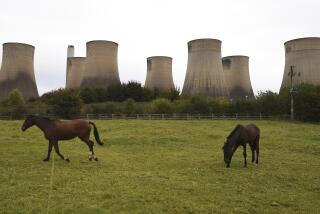Britain Forced to Back Off From Huge Coal Cutbacks : Industry: Public outrage pushes Major’s government into an embarrassing retreat on massive mine closures.
- Share via
LONDON — In a politically embarrassing about-face, the British government declared Monday that last week’s announced closing of more than half of the nation’s coal mines will be partially rescinded.
The original decision to close 31 out of 50 mines, at the cost of 30,000 miners’ jobs, had provoked a firestorm of public and political outrage nationwide. After a critical 2 1/2-hour meeting of his Cabinet on Monday, Prime Minister John Major surrendered to the anger, reversing his decision to wipe out most of Britain’s coal industry.
Major instructed Trade and Industry Secretary Michael Heseltine, who had recommended the cuts, to go before a stormy session of Parliament later Monday and spell out the government’s retreat:
Only 10 of the 31 coal mines earmarked last week for closure would be shut down by the end of the year. Instead of 30,000 jobs lost, there would be about 7,000 layoffs.
But Heseltine made clear that the stay of execution was only temporary. He told Parliament that if further closures were deemed necessary, they would proceed in a “phased program” to reduce surplus coal production.
“It is clear that many coal-field communities will continue to suffer significant job losses,” he said as angry members of Parliament from the opposition Labor Party jeered and hooted.
“You are cutting a pathetic figure here today, you and Major Wimp at the side of you!” replied Labor member Dennis Skinner. “In the name of God, go! And take the prime minister and the rest of the ragtag and bobtails with you!”
Malcolm Bruce, parliamentary spokesman for the smaller opposition party the Liberal Democrats, said, “A phased closure of these pits will do nothing to stem the anger of people who are outraged at the government tearing the industrial heart out of our economy.”
Although the government’s change of heart was widely welcomed by much of the public and by politicians, it did little to improve the prime minister’s precarious political position or the government’s sense of crisis.
Already, the Conservative government was reeling from criticism over its handling of the economy, especially over the steady erosion of jobs--more than 3 million--in the country’s deep 2-year-old recession and its disarray in trying to defend its weak pound sterling in Europe’s currency markets. Opposition politicians and the media say that Major has concentrated too much on fighting inflation, at the expense of encouraging economic growth, and that he lacks a coherent industrial strategy.
Archconservatives from Major’s own party had joined the political opposition, organized labor, the church and the media in scathing criticism of the government and state-owned British Coal for pushing the mine closures through without warning, leaving three-quarters of the mining work force facing joblessness within five months.
The massive mining layoffs threatened to kill off many coal-field communities that are totally dependent on the collieries.
The government seemed totally unprepared for the nationwide outcry over putting so many workers in a harsh and often dangerous industry out of work, some with only 72 hours’ notice. A debate on the issue scheduled for Wednesday had threatened the government with the prospect of a humiliating defeat in a key vote.
Monday’s policy switch has made it easier for the prime minister to win Wednesday’s vote. Still, the reversal made the government look even more directionless and dithering, coming as it did shortly after it reversed itself on remaining within the European Exchange Rate Mechanism (ERM).
Last month, when the pound came under attack in world currency markets, Chancellor of the Exchequer Norman Lamont tried desperately to keep its value within the range specified by the ERM, an agreement among all but one of the European Community’s 12 members to keep their national currencies within a specified range.
When massive buying of the pound by the Bank of England failed to halt the slide, Lamont announced two large interest-rate increases in one day. When even that failed to make the pound more attractive to investors, he and Major reversed most of the interest-rate increase and took Britain out of the ERM, promising to return quickly once the currency markets stabilized.
But since then, the government has waffled on its intention to re-enter the ERM, and its reversal has contributed to the continuing fall of the pound and a general lack of confidence in Major’s government among European finance officials.
Nor did Major’s reversal Monday satisfy the miners. “He’s taken us off the scaffold,” said one mining union official, “but put us on the rack.”
As recently as Friday, at a news conference after an EC summit in Birmingham, England, Major was saying that he would not reverse his decision on the coal industry. And Heseltine, whose ministry has overall responsibility for the closures, was still arguing over the weekend that British mines are uneconomical, producing more coal than anyone would buy and losing around $162 million a month as a result.
Heseltine noted that the principal customers of British Coal are electricity-generating plants, which were privatized two years ago. Now the power companies say they prefer to use natural gas to fire their plants.
Britain’s last great crisis with the miners came in 1985 when their union lost a showdown strike basically directed against Major’s predecessor, Margaret Thatcher. Thatcher successfully depicted their leader, Arthur Scargill, as the villain.
But in the last few days, the left-wing unionist has been seen as a defender of the interests of the miner, a figure with whom the British public has always sympathized.
More to Read
Sign up for Essential California
The most important California stories and recommendations in your inbox every morning.
You may occasionally receive promotional content from the Los Angeles Times.










